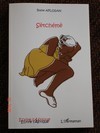« La Propension au Délire Collectif, Pain Béni des Jolis Prophètes | Accueil | Regard sur le "léger" Malaise du Ministre Burkinabè Djibril Bassolé »
10 mai 2013
L'utilisation des commentaires est désactivée pour cette note.
Les notes récentes
- Pour un Bénin Intègre, Dynamique et Juste : JaY 2016!
- Front Pour la Responsabilisation des Acteurs Publics: JYPPE 2016
- Bénin : Portrait Robot du Président en 2016
- 3 juil 2015 13:59:58
- France : A chacun son Egungun
- Tweet du Jour : Si « Institutions Complices » Veut dire Instrumentalisation, Alors c’est Raté
- Après Soro, Bientôt Hitler ou Pol Pot Pourront être Faits Dah à Titre Posthume au Bénin, ex-Danhomè
- Investiture de Me Adrien Houngbédji : Effet Critique d'un Discours de Sagesse
- Le Tweet du Jour : Soglo et son Numéro Gascon
- Monarchies, Rites et Temps : Tout Change et Rien ne Change
Holdup 2 Yayi !
- Holdup2Yayi
Jours
se sont écoulés
depuis le holdup
odieux perpétré par la bande des pilleurs diri gée par Yayi, valet-zombie de
la Françafrique
en terre du Bénin
Pages
- Archives & Catégories
- BABILOWN : BEST OF
- Babilown Essai 1
- Babilown Essai 2
- Babilown Essai 3
- Chronologie du royaume gun de Hogbonu
- Cliquer sur l'une des images ci-dessous pour accéder aux notes récentes
- Dix Instruments de Musique Béninois
- Dixit : Ils ont dit
- Etudes Dahoméennes 1
- Financement des partis politiques : Cas de la France et du Nigeria
- Flash-back sur le Tandem HOUNGBEDJI/LEHADY
- Haïku/Hovikléhoun
- HOMMAGE AU ROI GBÊHANZIN HÉROS NATIONAL
- La Haine de soi Dahoméenne en Chansons
- Le Livre Blanc sur l'Union Fait la Nation
- Les Dictateurs Africains
- Les Pensées de Blaise P., Intégrale
- Les Racines d'Obama
- LES TRIBULATIONS DU ROI KPOYIZOUN
- Liste des Députés
- Listes des Gouvernements Successifs du Président Yayi Boni de 2006 à 2010
- Où va le Bénin ?
- Page Philo 1 : Existentialism
- Pour l'Histoire /Consensus Mémoriel et Vérité Historique : Toffa et Béhanzin dans la Conscience Collective
- Pour l'Histoire : PRINCE SERGE AGBODJAN ; TÂCLES ET CONTRE-ATTAQUES CONSTITUTIONNELLES
- Pour L'HISTOIRE : COUP D’ETAT DU 26 OCTOBRE 1972 et AFFAIRE COVACS : Le Roman Crépusculaire de Pascal Chabi Kao
- Pour l'HISTOIRE : Le Roman Crépusculaire de Chabi Kao : Antoine Robert DETCHENOU Répond et Fait la Lumière
- Pour l'Histoire/LOUIS HUNKANRIN 1886 - 1964 : A DAHOMEYAN NATIONALIST ?
- Pour l'Histoire/LOUIS HUNKANRIN 1886 - 1964 : A DAHOMEYAN NATIONALIST ?
- Pour l'Histoire/LOUIS HUNKANRIN, le Nelson Mandela du Dahomey
- POUR LHISTOIRE/ Louis Hunkanrin, une Vie de Combat pour la Liberté.
- Supplique de Maria-Valentina, in Le Journal de Ouanilo
- The Raven/Le Corbeau, Edgard Allen Poe
- èmawolè-bienvenue
- ékpé
BeninInfo
Recherche
avril 2016
SETCHEME
SONGHAÏ
GO Benin
Technorati
Bénin-Tourisme
- Bénin-To
Catégories
- Actualité (81)
- Archives (8)
- Article (117)
- Bannière (32)
- Baro (3)
- BD (1)
- Bestof (2)
- Billet (37)
- Bio (1)
- Blogs (1)
- Brèves (1)
- Cinéma (6)
- concept (5)
- Cont-ext (282)
- Critique (148)
- Definitio (6)
- Diary (7)
- Dico (4)
- Docu (2)
- Dossier (25)
- Débat (30)
- Editorial (38)
- Essai (538)
- Ethic (11)
- Facto (6)
- Feedback (7)
- Fiction (140)
- haro (367)
- haïku (358)
- histo (228)
- hommage (127)
- humor (102)
- Idéo (456)
- Ilzondi (369)
- Image (379)
- Info (14)
- Interview (37)
- Jeux (2)
- Lecture (77)
- Lettre (97)
- Litté (249)
- Livravou (6)
- Livres (23)
- Media (3)
- Memory (153)
- Movies (248)
- Musique (109)
- novel (1)
- o'thentic (4)
- obituary (1)
- Onzeweb (2)
- Openculture (1)
- Pamphlet (505)
- Petites annonces (2)
- philo (1)
- porque (194)
- Press Link (86)
- Press Links (1252)
- Pub (289)
- Question & S (8)
- Recap7 (11)
- Religion (20)
- Repub (11)
- Santé (3)
- Science (28)
- Sensas (13)
- sketch (21)
- Sports (8)
- telex (12)
- Tou8 (333)
- Trad (178)
- télex (3)
- Télévision (3)
- Vif (3)
- Vox (9)
- Voyages (1)
- Weblogs (1)
- Witness (1)
- Y'en-a-marre (1)
- Émoiémoi (1)
- àTrad (86)
- étude (24)
Billet d'Afrique et d'Ailleurs
France Tv-Radio
France Tv-Radio
► Europe 1
► Radio France
► France Info
► RFI
► Arte
► BFM-TV
► BFM-Radio
► CNN
► Euronews
► France 2
► France 3
► France 24
► RFO
► Plein d'autres...
► Zapping du PAF
Soumbala Bénin-Livre
Langues Africaines
Le Chemin d'Agoué
Cour Constit.
Archive.Org
Libre Savoir
Sika-Info
IciLomé
Vacance à Biarritz
GNGWANE
AFRICAPHONIE
Charles Darwin
CVRA
O'BAOBAB
O-BAOBAB
Noces du Caméléon
CS-FDD-INFO
Bénin Mains Propres
Stand Up For Africa
- Stand Up For Africa
Les commentaires récents
- Zakari Dramani-Issifou de Cewelxa sur OBQ Met à Nu le Fantasme de Prix Nobel de la Paix derrière le Pseudo-Pacifisme de Tévoédjrè
- Thomas Coffi sur Janvier Yahouédéou Rassure le Bénin et sa Jeunesse, et Plaide pour une Gouvernance de l’Espoir
- Thomas Coffi sur Judas Contre Tartuffe : Sociologie de la Procuration des FCBE
- B.A. sur La Dynamique de l'Élection du Bureau de l’Assemblée : le Faux Gagnant et les Vrais Perdants
- Thomas Coffi sur La Dynamique de l'Élection du Bureau de l’Assemblée : le Faux Gagnant et les Vrais Perdants
- B.A. sur La Dynamique de l'Élection du Bureau de l’Assemblée : le Faux Gagnant et les Vrais Perdants
- Christophe Dossouvi sur La Dynamique de l'Élection du Bureau de l’Assemblée : le Faux Gagnant et les Vrais Perdants
- Thomas Coffi sur La Thématique de la Révision de la Constitution Chère à Yayi : Tel est Pris qui Croyait Prendre
- Thomas Coffi sur Le Tweet du Jour : Quand le Triste Sire Joël Aïvo Se Fait Philosophe du Temps, Autant en Emporte le Vent
- Thomas Coffi sur Bénin en Marche : Assemblée Nationale, les Deux “Houn” Dirigent le Parlement
Babilown Acro
Blog de
Aplogan
Blaise
Intransigeant
Libre
Original
Woofer
National
African Studies
MUSEE D'ABOMEY
SOSEKI : 夏目漱石
- SOSEKI : 夏目漱石
Mon amour a la couleur de la nuit Couleur des ténèbres Que vient visiter la lune
Global Voice
Le Kiosque
SOCIOLINGO
ODULAND
Catégories
- Actualité
- Archives
- Article
- Bannière
- Baro
- BD
- Bestof
- Billet
- Bio
- Blogs
- Brèves
- Cinéma
- concept
- Cont-ext
- Critique
- Definitio
- Diary
- Dico
- Docu
- Dossier
- Débat
- Editorial
- Essai
- Ethic
- Facto
- Feedback
- Fiction
- haro
- haïku
- histo
- hommage
- humor
- Idéo
- Ilzondi
- Image
- Info
- Interview
- Jeux
- Lecture
- Lettre
- Litté
- Livravou
- Livres
- Media
- Memory
- Movies
- Musique
- novel
- o'thentic
- obituary
- Onzeweb
- Openculture
- Pamphlet
- Petites annonces
- philo
- porque
- Press Link
- Press Links
- Pub
- Question & S
- Recap7
- Religion
- Repub
- Santé
- Science
- Sensas
- sketch
- Sports
- telex
- Tou8
- Trad
- télex
- Télévision
- Vif
- Vox
- Voyages
- Weblogs
- Witness
- Y'en-a-marre
- Émoiémoi
- àTrad
- étude
ÉTÈWUTU.com
- ETEWUTU.com
 Pourquoi ceci ? Pourquoi cela ? Tout ce que vous avez envie de savoir sur et autour du Bénin ... Osez le demander à ÉTÈWUTU.com
Pourquoi ceci ? Pourquoi cela ? Tout ce que vous avez envie de savoir sur et autour du Bénin ... Osez le demander à ÉTÈWUTU.com
Blog de Benoît Illassa
Regard sur le Bénin
Café Pédagogique
DICO-HISTOIRE
Pierre Bourdieu
Philo 24 h
Open Culture
Anazie
ADJAVIO
Canal U
Babelfeeds
Garde-Mots
Grandiose Parlor
Nigeria News Headlines
- Nigeria News Headlines
Ghana News Headlines
- Ghana News Headlines
Benin News Headlines
- Benin News Headlines
Béninculture
- Béninculture
Nelson Mandela Digital Archive
- Nelson Mandela Digital Archive
La Maison de l'Afrique
Solah Georgina Blog
- Solah Georgina Blog
Babilown Mawolè
Sowole Arts Blog
- Sowole Arts Blog
Google Ana
- Google Ana
art-BIVNZE
Pambazuka
- Pambazuka News
Passeur 2 Sciences
- Passeur 2 Sciences







Commentaires